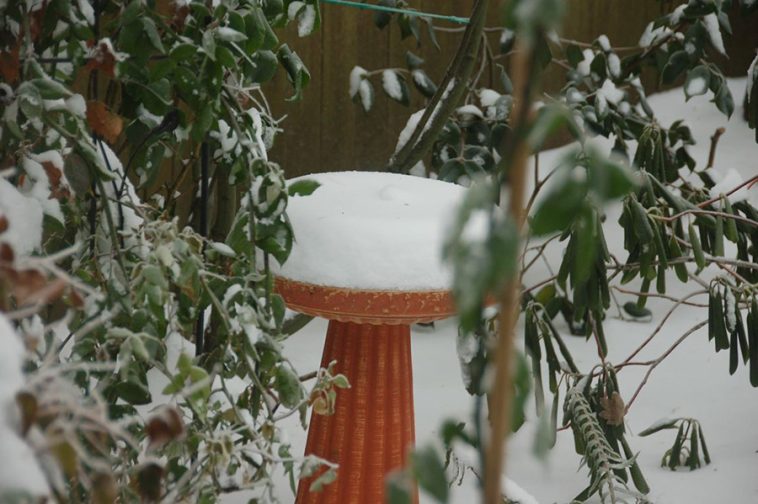The Apostrophe Blog
Photo by John Laurence
Is it me or does life’s decibel level seem to increase exponentially during the December holidays? It’s not only the music—“Frosty the Snowman” to a reggae beat or the Chipmunks’ version of “Jingle Bells.” Whenever I venture out and about in the world, I encounter more people, more cars, more honking and squealing, by far and away, more noise, noise, noise.
A few days before our Pacific Northwest world was hit with arctic blasts of freezing rain and wind and snow, I walked to and from the nearby New Seasons market where certifiable madness was in progress: too many people with too-full carts, everybody in a frenzy grabbing at too many things, the grating singsong of assorted cell phone rings followed by those too-loud-on-the-phone voices. The inevitably overtired and crying kids.
Uproar. Racket. Babel.
Hubbub. Cacophony. Din.
The English language offers a bevy of (in my view) richly poetic words to describe the hullabaloo and clamor that too often bombard our modern ears. And the opposite of all this noise? One simple, humble, and perhaps under-appreciated word: silence.
In the spring of 2006, we took a trip to the Adriatic. In that part of the world, it’s a simple thing to find poetry everywhere. All you have to do is look—and listen. It’s in the stones and the façades, the window shutters and iron grillwork along the canals of Venice. In the wide marble stradum of old town Dubrovnik and the shiny marble streets of medieval towns on the Adriatic islands of Korkula and Hvar. It’s in days of quiet beauty and nights of watery calm where church bells and footsteps become the predominant sounds. One day as we traveled by ferry from one island to the next, I read a New Yorker((www.newyorker.com)) essay by David Owen about the re-invention of Muzak((www.newyorker.com/archive/2006/04/10/060410fa_fact)) for the 21st century. Owen writes:
“During Muzak’s early decades, office workers and others sometimes complained that public background music was an invasion of privacy. Some people feel that way today, although the first thing many of us do when we find ourselves alone with our thoughts is to reach for the handiest means of drowning them out—by putting on a pair of headphones, say, or sliding a disk into the car’s CD player. … ‘Our biggest competitor,’ a member of Muzak’s marketing department told me, ‘is silence.’ ”
On the long flight home from Croatia, I stumbled on this quote from Charles Simic((en.wikipedia.org/wiki/Charles_Simic)), the Belgrade-born, Serbian-American former poet laureate, in an anthology: “Poetry is an orphan of silence. The words never quite equal the experience behind them. We are always at the beginning, eternal apprentices.”
If poetry is an orphan of silence—and silence is jeopardized by the incessant and ubiquitous presence of sound (let’s be kind and call it that rather than noise) that many of us select, indeed privilege, over even our very thoughts—what does that say for the fate of poetry in this cacophonous world?
I was thinking about such lofty subjects when the Great Arctic Blast of 2008 struck Portland, Oregon, earlier this month, making many of us snowbound on our unplowed and thus not navigable city streets. We live within walking distance of groceries, brewpubs, and eateries so getting the basics and then some isn’t much of a problem for us. I pulled out my Sorels, serious winter boots from my upstate New York days, and headed out the door. Without cars and snow shovels and snow blowers and plows and delivery trucks and (for that matter) many walking people, our snow-covered neighborhood was pristinely white and surprisingly, wonderfully silent. Everywhere I clomped in my unwieldy boots, simple beauty—often the seeds for poetry of place, of timelessness, of the power of nature—was in abundance.
A thick mushroom of ice on top of a bird feeder which swung back and forth even as the nuthatches flitted around the openings in search of oiled sunflower seeds. Ice that rimmed a streetlight, coated a stop sign, refracted the colors in an outdoor holiday light display. Ice illuminating and defining every tree branch, every rosemary sprig, every bent and browning perennial. An autumn-tinged maple leaf frozen into a jagged rectangle of ice that began to drip and disappear the minute I picked it up.
I crunched through the ice-topped snow for another seven or eight blocks, wandering in my world of quiet and white. During my trek, I ran into only one other person, a man trying to shovel out his car with a garden spade. We smiled and waved and shook our heads. No words needed, understanding complete.
When my fleece-gloved hands grew numb from the wet and cold, I headed for home. Back inside, the world swiftly returned to sounds: the soprano buzz of the iBook, the whoosh of the furnace kicking on, the drip of coffee into a stainless steel pot. I stood at a window, listening to the chirp of finches and chickadees outside in our garden where three big leaf maples stand sentinel, tall and unmoving. They thrive in silence, I thought. Their preferred medium of communication. Once my fingers warmed up, I jotted a few notes. With the New Year and the coming thaw, perhaps, too, a poem?
- Don’t Fence Me In! - July 5, 2025
- Nothing to Celebrate Today… - July 4, 2025
- Call It By Its Name - July 2, 2025

